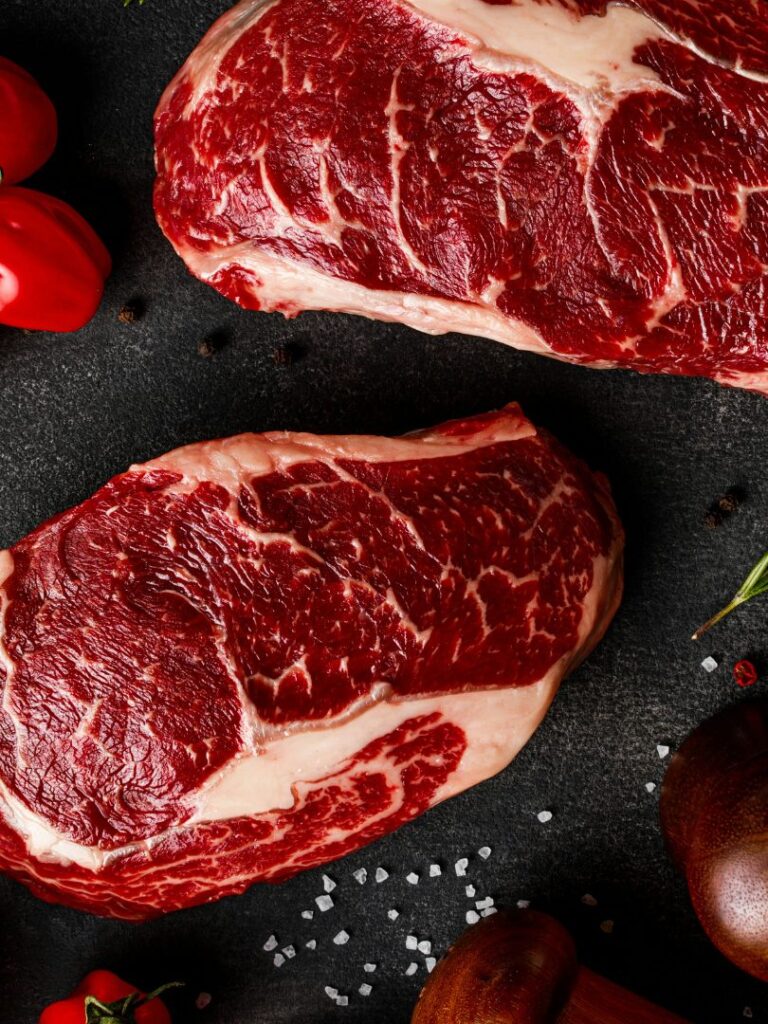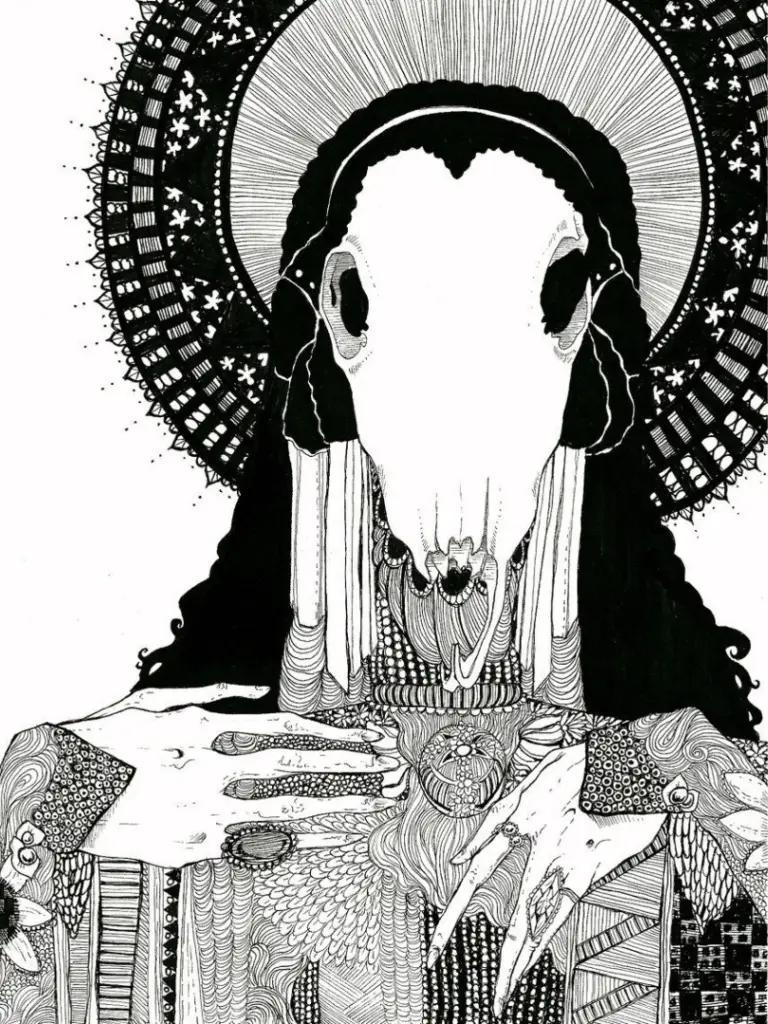In Bali, where the quest for healing turns many visitors into wellness crusaders, going vegan has become a rite of passage. Yet, a surprising twist emerged over the past couple of years: the rise of the Ubud Carnivore Club and a wave of new steakhouses marking a retreat from plant-based obsession. Why is proclaiming a craving for steak no longer an unspeakable offence in the spiritual sanctuary of Ubud? How did eating meat morph into a symbol of unwokeness to begin with? And what has ego got to do with our dinner choices?

We all know meat is bad.
Today, meat is the villain, and fat is its diabolical superpower. The tale of meat’s downfall is replete with irony and unintended consequences, much like some darkly comic novel. It starts in the 1950s with Ancel Keys, whose relentless strategic advocacy helped establish the fat-is-bad idea. His theories gained traction through endorsements from prominent figures such as Paul Dudley White, cardiologist and personal doctor to the weak-hearted President Eisenhower, and the American Heart Association (AHA), which had received millions from Procter & Gamble, one of the largest makers of vegetable oil. Thus began the era of low-saturated-fat zealotry.
Throughout the 1960s and 1970s, academics pointed to flaws in this hypothesis but these were largely sidelined. One of the reasons the myth has persisted has been the poor quality of research. Many studies comparing meat-eaters to non-meat-eaters have overlooked confounding factors such as the ‘healthy user’ bias. Picture a typical vegan: health-conscious, label-aware, and disciplined—probably the kind of person who exercises regularly, avoids alcohol, and sticks to a regimen of virtuous habits. In contrast, a meat-eater is more likely to scoff at health warnings, devour processed foods, and indulge in a beer too many in front of TV in the evenings. These lifestyle choices, which are likely to affect health markers negatively, are then conflated with the impact of meat consumption, obscuring the true relationship between meat-eating and health outcomes.

It wasn’t until the late 90s that the research methods improved significantly, making it possible to account for all the interfering factors and biases. Since then, numerous studies, including extensive reviews by Cambridge and Harvard researchers, have finally been able to isolate the long-term effects of eating non-processed high-quality animal protein.
It turns out that animal fats help maintain stable glucose levels and provide consistent energy. Meat supports nervous system health by improving mood and alleviating disorders like depression and anxiety; its amino acids are essential for synthesizing neurotransmitters like serotonin and dopamine, which regulate mood and cognition. Meat is also a key source of vitamin B12, iron, and zinc, which are vital for nerve health, cognitive function, and glucose metabolism, reducing the risk of insulin resistance and type 2 diabetes—just a few of the critical benefits that fatty meat can offer.
Public delusion, however, persists. Several vegans I interviewed asserted, “We all know meat is bad for you.” This highlights a troubling divide between scientific evidence and public perception. Information is often compromised by media hysteria, research complexity, lobbying interests, and social media echo chambers. Consider the government-authorised Australian Health Star Rating on food labels that, paradoxically, grant a protein powder packed with controversial artificial ingredients such as sucralose a perfect 5-star rating, while butter is stuck at 3/5. Such absurdities underscore a deeper issue: the challenge of discerning trustworthy information amidst the overwhelming influx of data. The belief that medical and governmental institutions are infallible and free from political or profit-driven motives, or human error, is persistent, albeit entirely unrealistic.
Plants are trying to kill you
Telling vegans that their plant-based paradise might not be all it’s cracked up to be is like yanking the beard of the shopping mall Santa in front of innocent kids. Yank we must, as many people remain unaware of the complexities and potential shortcomings of a vegan diet, making it ill-suited for some.
Multiple studies confirm that a typical vegan diet is associated with various nutritional deficiencies including lower protein quality and quantity. Theoretically, we can get everything we need from plants, but it’s as tough as knitting with spaghetti. For starters, all protein is created equal. Proteins are composed of nine essential amino acids, each serving a distinct function. Not all plant sources provide all nine amino acids, meaning that we need to be fairly well-versed in food science to make sure we are consuming the correct mix. To meet her daily amino acid needs, a 60kg woman would need to consume seven cups of cooked quinoa (that’s 1.3 kg), compared to just two cups of beef or salmon.

Then there’s the matter of bioavailability. Animal proteins, found in meat, dairy, and eggs, are generally better absorbed due to their simpler structure and lack of fiber, giving them a higher Protein Digestibility-Corrected Amino Acid Score (PDCAAS), while fiber and anti-nutrients in plant protein can obstruct absorption. Not to mention, plants have their own defences. Anti-nutrients like oxalates in vegetables can bind to essential minerals, reducing their availability and potentially causing issues for those with certain sensitivities or pre-existing conditions.
Proponents of veganism argue that these deficiencies can be addressed through supplements. But is that a satisfactory solution? Can the quality and digestibility of supplements be trusted? Despite our scientific advancements, we can’t yet fully mimic nature. The complexity of natural nutrients remains beyond our full grasp, and compounds continue to elude our attempts at isolation and replication.
Dig into modern production and distribution systems, and the plant paradise is looking even more bleak. The nutritional value of plant produce declines dramatically soon after harvesting. For instance, half of the vitamin C in spinach is lost within days. Yet it takes a staggering 3-4 weeks for spinach harvested in China to reach a consumer in Bali, while an orange from Brazil might journey for 6-8 weeks. The practice of harvesting fruits and vegetables before they ripen to ensure freshness through the supply chain maze further diminishes the vitamin content, as do some of our favourite cooking methods.

There’s more. I must ask, what exactly are we eating? After spending nearly a decade in Asia eating locally, I returned to North America to find myself amidst food I no longer recognize. Fruits and vegetables are grotesquely oversized, unnaturally saccharine and suspiciously perfect. Potatoes don’t brown; spinach stays fresh for weeks; corn, yamsand apples are all sweeter than candy. Research shows that modifications intended to enhance shelf life, taste or appearance affect the levels of vitamins, minerals, and antioxidants. The modern agriculture industry, with its tweaks and twiddles, produces food that is visually spectacular and practically appealing, but lacks the essential qualities that once defined the simple, natural bounty of the past. And it’s not just plant produce that’s problematic—meat production is equally fraught with issues, from antibiotics to ethical concerns, casting a shadow over our food system as a whole.
From savagery to enlightenment.
What adds layers to this dilemma is that, for some, the choice of what to eat is entangled in a web of personal and cultural factors that extend beyond health. Bali’s vegan queen, founder of one of the island’s most celebrated vegan establishments, said, “I don’t care if tomorrow the research will definitively demonstrate that eating meat is the best thing we can do for our health. My first and foremost reason not to eat meat is ethical and spiritual.”
According to some spiritual traditions, humans have the capacity to transcend ordinary states of consciousness and experience reunion with the divine. Practices like a light vegan or vegetarian diet, meditation, and breathwork are believed to help us align with prana, the vital life force. Vegans are not just eating (or, rather, not eating). They are creating a better world – one of mindfulness, love and spiritual evolution. Non-killing is seen as an evolved choice. As one former vegan puts it “I thought I was saving the planet. I was saving creatures. Fewer deaths and suffering. That felt really good.” This narrative gives a sense of purpose and belonging, a life mission. It’s a crusade that divides the world into the righteous and the damned —one vegan even declaring, “We live in the truth, the other side is demonic.”

In researching this article, I aimed to present a balanced debate between proponents of vegan and carnivore diets. However, a constructive intelligent dialogue failed to materialize. Many interviews, particularly with vegans, were marred by ideological zeal and emotional conviction that defies empirical scrutiny. Extreme beliefs often led to selective evidence gathering and dismissive attitudes towards data that challenges one’s views. Conversations with ardent vegans frequently devolved into absurdities; for instance, presenting research on the health benefits of animal protein was met with, “Why are you oppressing me with statistics?” as if the mere presentation of data were an act of aggression rather than a search for truth.
Choosing not to eat meat is not inherently problematic. Rather, an issue arises when a private decision becomes a platform for presenting personal opinions and preferences as solid facts and moral imperatives we all must follow.
Homeostasis
Any rigid food ideology that insists on permanently excluding an entire food group undermines our natural potential. It’s unrealistic to expect our needs to remain static throughout our lives. Environment shifts, needs evolve with age, and priorities change as circumstances do. Doesn’t it seem logical, then, to prioritize flexibility, and adapt to changes as they come, mirroring the natural world’s continual adaptation?
Post-surgery, for example, we need nutrient-dense, easily available building blocks. Similarly, if we’re wrestling with chronic illness or anxiety and depression, a diet high in fatty acids and high-quality animal protein might be the best thing we can do for our body. For women, the stakes are especially high. In preparation for this article, I spoke to midwives and women devastated by their inability to conceive or keep a healthy pregnancy after a lifelong exclusion of animal products. I found it deeply unsettling when a prominent vegan restaurateur with a cult following admitted that eating meat might have helped her realize her failed dream of motherhood—an admission conspicuously missing from her social media posts celebrating and promoting veganism.

What I found compelling about the carnivore perspective is its no-nonsense, tactical approach to food. For carnivores, food is seen not as entertainment, a social tool, or an ideological statement, but as fuel and medicine. Health comes first. I asked meat-eaters if they thought such a focus was selfish – didn’t they too want to contribute to building a better world? They maintained that being in peak health must be a priority for anyone who is serious about driving sustainable large-scale positive change.
Today, the weight of choosing what’s for dinner feels almost unbearably heavy. We are urged to view our food choices as pivotal to saving both our planet and our souls, with the meat industry’s environmental toll often spotlighted as a major concern. But perhaps, instead of fixating on individual food choices as the ultimate solution, we should focus on leveraging our collective intellect and health—nourished by high-quality, clean, natural food—to tackle the broader, systemic issues of industrialized society. Moving away from highly processed and artificially enhanced foods—whether they’re vegetable oils, tampered produce, or antibiotic-laden animal products—toward simpler, seasonal, and locally sourced options seems like a more pragmatic approach. In our globalised world increasingly burdened by complexity and contradiction, embracing simplicity and sustainability might just be the key to achieving a more harmonious balance between our health, our environment, and our future.
Join us for our hunt for the best steak in Bali in our COOLHUNTRESS section. Or read about our latest steak pick here.








2 thoughts on “Is Carnivore The New Vegan?”
Pingback: Fuego: The Best steak in Bali - MWB curated pick of the month.
Wonderfully well balanced article thank you.